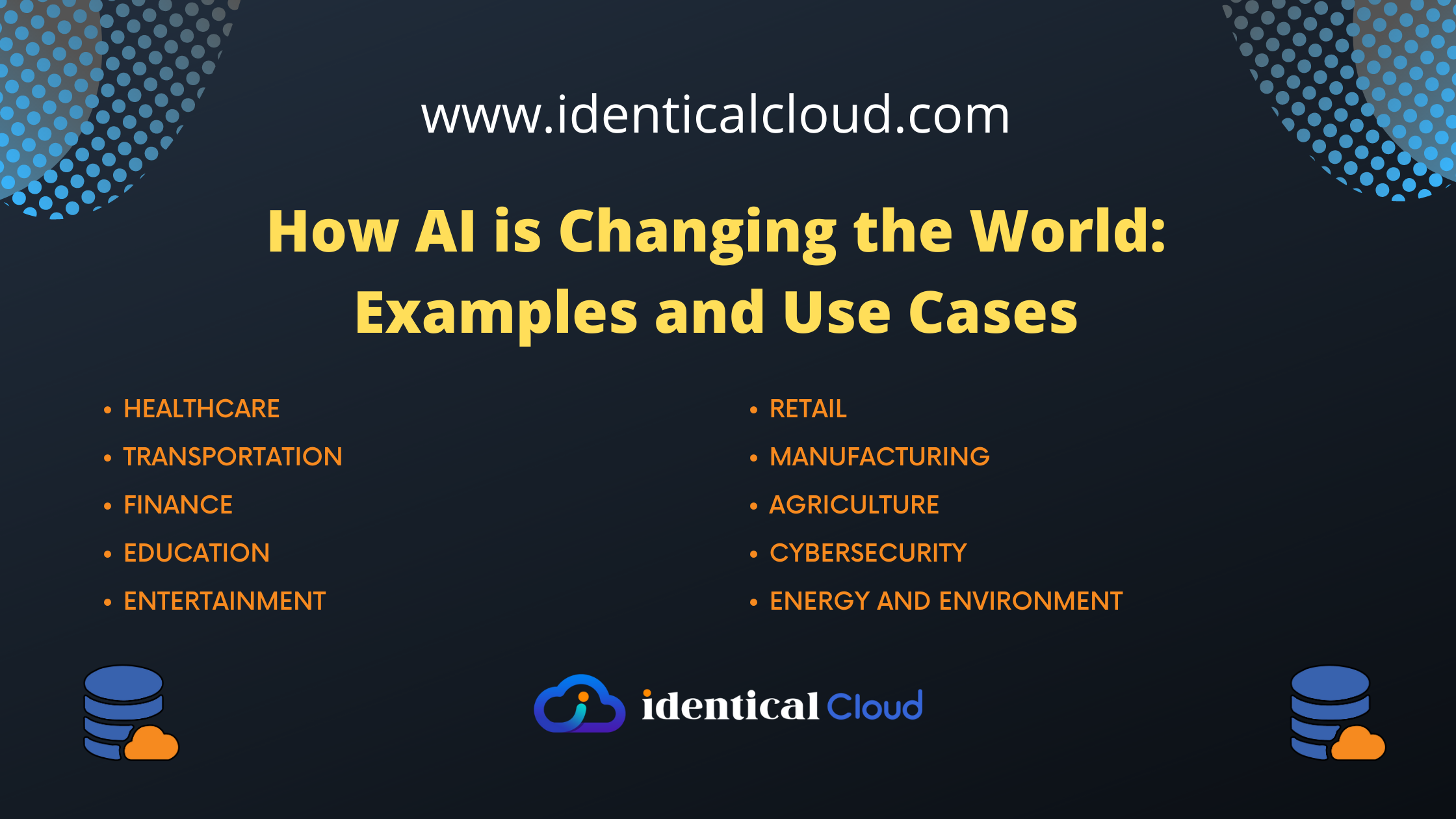
How AI is Changing the World: Examples and Use Cases of a Transformational Technology
How AI is Changing the World: Examples and Use Cases of a Transformational Technology
Artificial Intelligence (AI) is revolutionizing the world as we know it, permeating various industries and transforming the way we live, work, and interact. In this blog, we will explore the profound impact of AI by examining real-world examples and use cases across different sectors. From healthcare and finance to transportation and entertainment, AI is reshaping our world in remarkable ways.
- Healthcare:
AI is revolutionizing healthcare by improving diagnosis accuracy, enabling personalized treatments, and speeding up drug discovery. Examples include AI algorithms that analyze medical imaging data to detect diseases like cancer, AI-powered chatbots that provide virtual health consultations, and machine learning models that predict patient outcomes based on medical records. - Transportation:
AI is transforming transportation with autonomous vehicles, intelligent traffic management systems, and predictive maintenance. Companies like Tesla and Waymo are developing self-driving cars that can navigate roads safely and efficiently. AI algorithms are also used to optimize traffic flow, reduce congestion, and improve transportation safety. - Finance:
The financial sector benefits from AI-powered solutions such as fraud detection algorithms, algorithmic trading systems, and chatbots for customer support. AI analyzes vast amounts of financial data to identify patterns and anomalies, helping detect fraudulent activities. Machine learning algorithms also analyze market trends and execute trades in milliseconds, enabling faster and more efficient trading. - Education:
AI is advancing education through adaptive learning platforms, intelligent tutoring systems, and personalized content delivery. For instance, platforms like Khan Academy and Duolingo use AI algorithms to adapt learning materials to individual student needs, providing tailored instruction and feedback. AI-powered chatbots are also being used for virtual tutoring and answering students’ questions. - Entertainment:
The entertainment industry benefits from AI-driven recommendation systems, virtual reality experiences, and content creation tools. Companies like Netflix and Spotify use AI algorithms to suggest personalized movies, shows, and music based on users’ preferences. AI is also employed in the creation of visual effects in movies and games, enhancing the overall entertainment experience. - Retail:
AI is transforming the retail industry through personalized marketing, inventory management, and chatbot assistants. Retailers use AI algorithms to analyze customer data and provide personalized recommendations, improving customer satisfaction and driving sales. AI-powered chatbots assist customers with product inquiries, order tracking, and support, enhancing the overall shopping experience. - Manufacturing:
AI is revolutionizing manufacturing processes with robotics, automation, and predictive maintenance. Robots equipped with AI capabilities can perform complex tasks with precision, improving production efficiency. AI algorithms analyze sensor data to predict machine failures, enabling proactive maintenance and minimizing downtime. - Agriculture:
AI is transforming agriculture by enabling precision farming, crop monitoring, and livestock management. AI-powered drones and sensors collect data on soil conditions, crop health, and water usage, helping farmers optimize resources and increase yields. AI algorithms also assist in early pest detection and disease prevention, ensuring better crop management. - Cybersecurity:
AI plays a crucial role in cybersecurity by detecting and preventing cyber threats in real-time. Machine learning models analyze network traffic patterns, identify anomalies, and flag potential security breaches. AI algorithms continuously learn from new data to enhance threat detection and response capabilities. - Energy and Environment:
AI contributes to sustainable energy management and environmental conservation. Smart grids powered by AI optimize energy distribution, reducing waste and promoting renewable energy integration. AI algorithms also assist in climate modeling, aiding in predicting and mitigating the impacts of climate change.
The examples and use cases presented demonstrate the wide-ranging impact of AI on various sectors. From healthcare advancements and transportation innovations to finance, education, and entertainment, AI is reshaping industries and transforming the way we live. As AI continues to evolve, it is crucial to ensure responsible development and address ethical considerations. Embracing the potential of AI while navigating its challenges will lead us to a future where this transformative technology augments our lives, making the world a better place.
